
Atom Egoyan is a Canadian filmmaker. Emerging in the 1980s as part of the Toronto New Wave, he made his career breakthrough with Exotica (1994), a film set in a strip club. Egoyan's most critically acclaimed film is the drama The Sweet Hereafter (1997), for which he received two Academy Award nominations. His biggest commercial success is the erotic thriller Chloe (2009).

Stuart Bruce Greenwood is a Canadian actor and producer. He has starred in five films by Canadian filmmaker Atom Egoyan and has been nominated for three Canadian Screen Awards, once for Best Actor for Elephant Song (2014) and twice for Best Supporting Actor, for The Sweet Hereafter (1997) and Being Julia (2004).
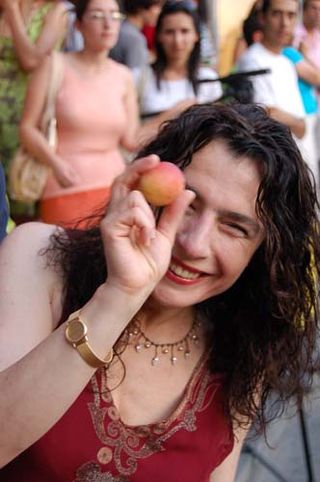
Arsinée Khanjian is a Canadian actress and activist. She is widely known for her collaborations with her husband, filmmaker Atom Egoyan. She won the 2003 Genie Award for Best Performance by an Actress in a Leading Role for her role in Ararat.
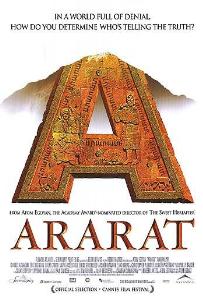
Ararat is a 2002 historical-drama film written and directed by Atom Egoyan and starring Charles Aznavour, Christopher Plummer, David Alpay, Arsinée Khanjian, Eric Bogosian, Bruce Greenwood and Elias Koteas. It is about a family and film crew in Toronto working on a film based loosely on the 1915 defense of Van during the Armenian genocide. In addition to exploring the human impact of that specific historical event, Ararat examines the nature of truth and its representation through art. The genocide is denied by the Government of Turkey, an issue that partially inspired and is explored in the film.

Don McKellar is a Canadian actor, writer, playwright, and filmmaker. He was part of a loosely-affiliated group of filmmakers to emerge from Toronto known as the Toronto New Wave.
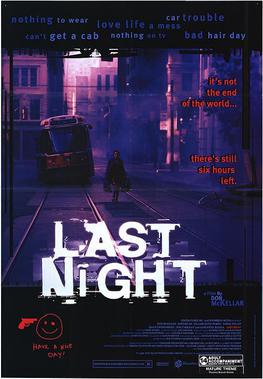
Last Night is a 1998 Canadian apocalyptic black comedy-drama film directed by Don McKellar and starring McKellar, Sandra Oh and Callum Keith Rennie. It was produced as part of the French film project 2000, Seen By.... McKellar wrote the screenplay about how ordinary people would react to an unstated imminent global catastrophic event. Set in Toronto, Ontario, the film was made and released when many were concerned about the Year 2000 problem.

Léolo is a 1992 French Canadian coming-of-age fantasy comedy-drama film by director Jean-Claude Lauzon. The film tells the story of a young boy named Léo "Léolo" Lauzon, played by Maxime Collin, who engages in an active fantasy life while growing up with his Montreal family, and begins to have sexual fantasies about his neighbour Bianca, played by Giuditta del Vecchio. The film also stars Ginette Reno, Pierre Bourgault, Andrée Lachapelle, Denys Arcand, Julien Guiomar, and Germain Houde. Gilbert Sicotte narrates the film as the adult Léolo.

Felicia's Journey is a 1999 psychological thriller film written and directed by Atom Egoyan and starring Elaine Cassidy and Bob Hoskins. It is based on the prize-winning 1994 novel of the same name by William Trevor. It was entered into the 1999 Cannes Film Festival and won four Genie Awards, including Best Adapted Screenplay.
The 15th Genie Awards were held on December 7, 1994 to honour Canadian films released in 1993. Actor Graham Greene hosted the ceremony.
"Everybody Knows" is a song written by Canadian singer-songwriter Leonard Cohen and collaborator Sharon Robinson. It has often been covered and used in soundtracks.

The Adjuster is a 1991 Canadian drama film directed by Atom Egoyan, his fourth feature film and the first to achieve international acclaim. The film won five awards, as well as two other nominations upon its initial release.
The Academy of Canadian Cinema and Television presents an annual award for Best Achievement in Direction to the best work by a director of a Canadian film.
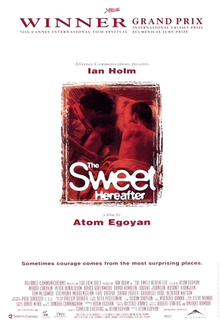
The Sweet Hereafter is a 1997 Canadian drama film written and directed by Atom Egoyan, adapted from the 1991 novel by Russell Banks. It tells the story of a school bus accident in a small town that kills 14 children. Survivors and grieving parents file a class-action lawsuit. This proves divisive in the community and becomes tied with personal and family issues. The ensemble cast includes Ian Holm, Sarah Polley, Maury Chaykin, Bruce Greenwood, Tom McCamus, Gabrielle Rose, Arsinée Khanjian and Alberta Watson.

Adoration is a 2008 Canadian drama film written and directed by Atom Egoyan and starring Arsinée Khanjian, Scott Speedman, Rachel Blanchard, Noam Jenkins, Devon Bostick, and Kenneth Welsh.
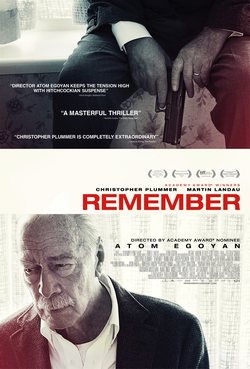
Remember is a 2015 drama thriller film directed by Atom Egoyan and written by Benjamin August. Starring Christopher Plummer, Bruno Ganz, Jürgen Prochnow, Heinz Lieven, Henry Czerny, Dean Norris and Martin Landau, it was a co-production of Canada and Germany. The plot follows an elderly Holocaust survivor with dementia who sets out to kill a Nazi war criminal in retaliation for the death of his family and was inspired by August's consideration that there were fewer parts for senior actors in recent years.
Camelia Frieberg is a Canadian film producer and director. She is a two-time winner of the Genie Award for Best Picture, as producer of Atom Egoyan's films Exotica and The Sweet Hereafter.
Henri Béhar is a subtitler, film critic and journalist who is best known for his regular participation in the Cannes Film Festival and for his subtitling of many well-known films.
The Toronto New Wave refers to a loose-knit group of filmmakers from Toronto who came of age during the 1980s and early 1990s.
Linda Del Rosario is a Canadian production designer and art director.
Richard Paris is a Canadian production designer and art director based in Vancouver, British Columbia.















